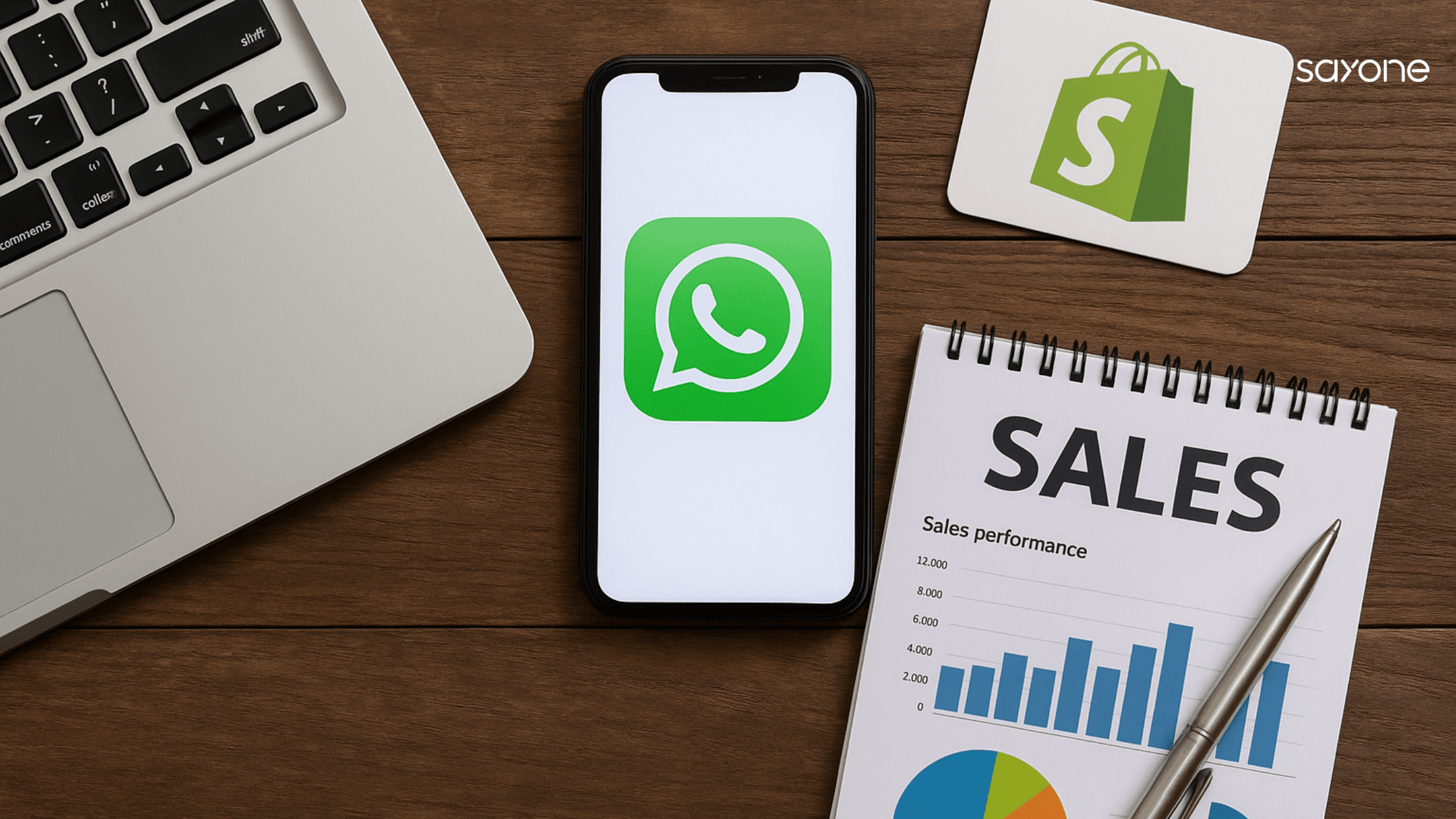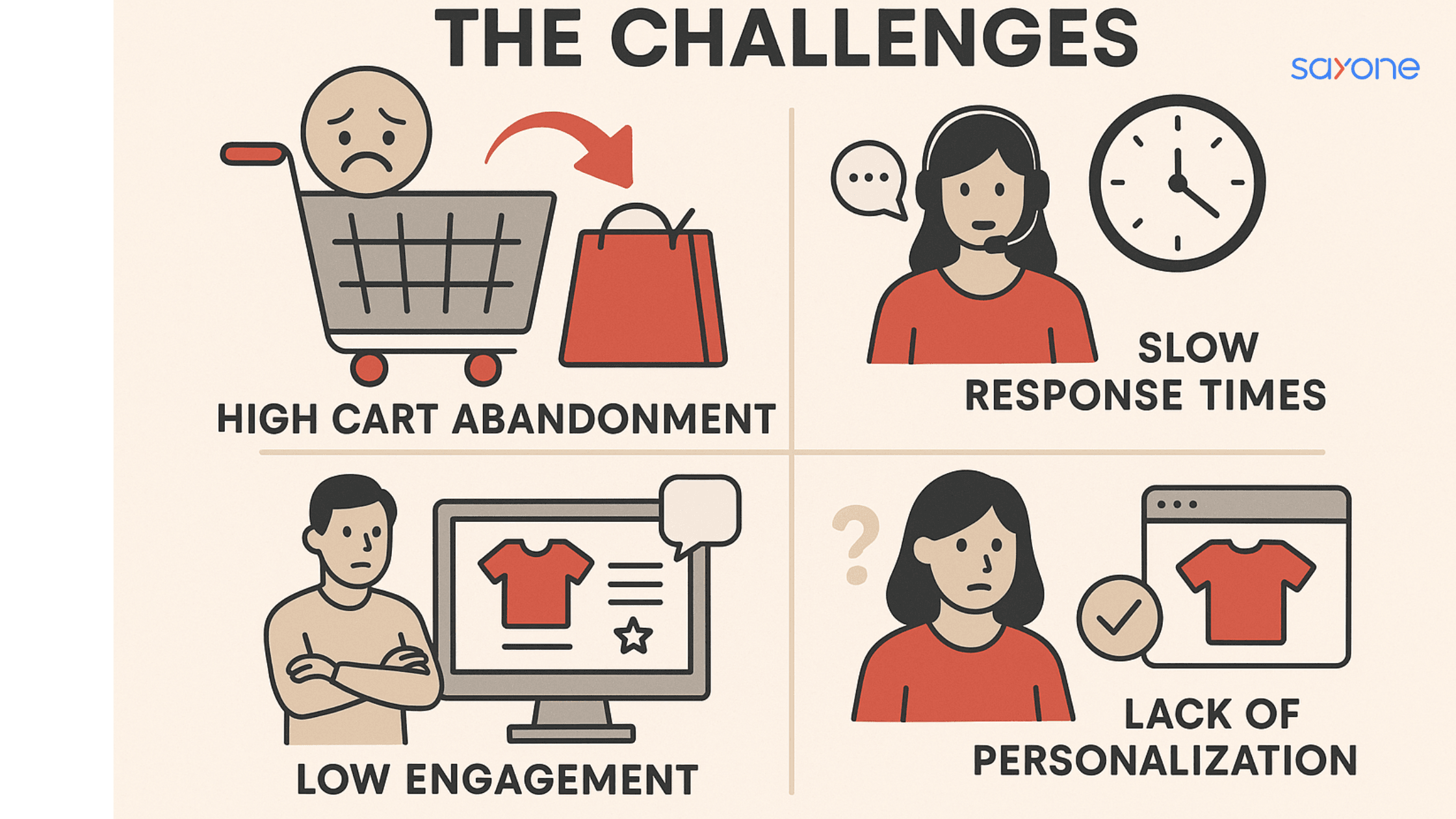
Subscribe to our Blog
We're committed to your privacy. SayOne uses the information you provide to us to contact you about our relevant content, products, and services. check out our privacy policy.

Akhil SundarOctober 29, 20254 min read

Generating table of contents...
**Your customers are already on WhatsApp, so why isn’t your store? ** With more than 3 billion monthly active users worldwide, WhatsApp is a promising platform through which you can influence and engage your customers to bring in more sales to your e-commerce store. Learn how an e-commerce fashion retailer increased sales by 25% by integrating WhatsApp as their sales assistant through this case study. It showcases how a widely used messaging platform can transform your relationship with customers and upgrade your business.
A rapidly expanding Shopify-fashion retailer struggled to convert website visitors and leads, even with a dedicated support team. They failed to communicate effectively with customers and address their personal and complex questions through the website. Hence, the team collaborated with SayOne to close a key gap in their buyer's journey: real-time interaction by integrating a familiar messaging platform.
Below are the costly challenges that the store faced that significantly affected the store’s performance and revenue.

More than 70% of customers left the cart without initiating checkout, often due to unanswered questions and hesitation around product fit.
Since the customers inquired through emails and web chat, the responses were delayed frequently, failing to prompt action.
Through static product pages and generic email campaigns, the store failed to attract meaningful engagement, leaving visitors unmotivated.
The shopping process was one-size-fits-all and failed to provide personalized recommendations or assistance to their customers.
The team realized the need for a more interactive and real-time approach to engage customers, particularly in key decision points.
SayOne addressed their challenges by connecting the Shopify store with WhatsApp via Twilio and a Python backend. This conversational commerce strategy based on WhatsApp turned it into an active sales assistant that could guide, assist, and convert customers in real-time.
The developed system triggered WhatsApp messages with direct links to the abandoned cart and promotions, after a set period of inactivity, encouraging customers to complete their purchases.
The new setup enabled answering customer queries in under 2 minutes by automating responses to commonly asked questions, such as shipping times, return policies, and order status.
WhatsApp presented itself as a dynamic and conversational interface where customers could ask questions, get recommendations, and receive updates.
The WhatsApp assistant achieved personalization by retrieving Shopify data on customer names, order history, and browsing behavior, which were used to customize messages.
The implementation was completed in 2 weeks; however, the following challenges were encountered.
Twilio's webhook callbacks sometimes suffered from latency spikes during high-traffic periods, which we fixed by introducing retry logic and asynchronous processing.
Twilio has very strict rate limits on outgoing messages. Therefore, we created a dynamic queuing system that gave time-critical messages such as cart reminders and order confirmations.
In order to ensure robust error handling, we implemented structured logging and alerting to monitor failures in message delivery, API calls, and backend logic, allowing for rapid debugging and resolution.
The effect of the WhatsApp sales assistant was instantaneous and quantifiable. Here's what the e-commerce store gained:
Users who engaged with the WhatsApp assistant converted at 18.2% versus a site average of 9.1%.
Personalized messages and automated reminders encouraged reluctant customers to finish their purchases.
Customer satisfaction ratings rose by 40%, with customers praising the assistant's speed and helpfulness.
The Python-driven bot answered product-related questions, order tracking, and returns autonomously.
Creating a responsive sales assistant requires reimagining how we work with data, errors, and user sessions. We have to expect latency, rate limits, and design systems that recover well without interfering with the customer experience.
Monitoring message open rates, conversion sequences, and drop-off locations, even after launch is very important. They are necessary to adjust the assistant's timing, messaging, and escalation rules. We learned that launch is only the starting point; optimization is where the real value comes in.
Building on the integration of WhatsApp and Shopify, the e-commerce store plans to enable in-chat checkout and payments, allowing customers to complete purchases without leaving the conversation.
If your e-commerce store is struggling to improve sales or customer engagement, WhatsApp can be your most effective sales assistant. Schedule a free consultation, and let us discuss strategies to grow your business and stay top of mind with customers.

We're committed to your privacy. SayOne uses the information you provide to us to contact you about our relevant content, products, and services. check out our privacy policy.

About Author
Subject Matter Expert

We collaborate with visionary leaders on projects that focus on quality